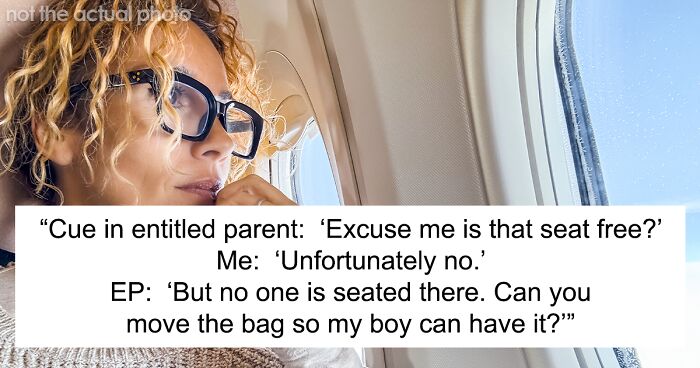
Parent Wants Service Dog Moved For “Baby Boy’s” Window Seat, Gets A Reality Check
InterviewTraveling can be tiresome as it is, but some people manage to make it even more exhausting with their demands.
For this redditor, it was an entitled parent who disturbed what could have been a completely uneventful flight. The parent wanted their “baby boy” to get the seat that was reserved for the OP’s assistance dog, but the owner was not willing to give in to their entitled ways.
Bored Panda has reached out to the OP and they were kind enough to answer a few of our questions. You will find their thoughts in the text below, where you will also find our interview with Chloë Hammond, a UK-based nurse and the handler of an assistance dog named Ocho.
Under certain conditions, assistance dogs can accompany their owners on flights
Image credits: Can Do Canines (not the actual photo)
This person refused to give up their assistance dog’s seat to an entitled parent’s “baby boy”
Image credits: simonapilolla (not the actual photo)
Image source: silver_splash
Assistance dogs provide crucial practical assistive tasks
Image credits: U.S. Department of Agriculture (not the actual photo)
Sometimes it seems that plane seats bring out the worst in people. While politely asking someone to switch seats is in no way bad when you can take no for an answer, fighting passengers for something that’s rightfully theirs is distasteful at best.
The entitled parent asking for the seat next to the OP did eventually take no for an answer, but not without spending the rest of the flight saying that the redditor “hated children”. But in reality, the reason was completely different—the seat was reserved for their assistance dog, which, as the OP pointed out in the comments, was part of a social program for integration of people with disabilities in society.
While some people might have thought the passenger was just traveling with their pet, it’s important to distinguish that an assistance dog—typically wearing a sign pointing that out—is not simply a beloved pet. According to Dogs For Autism, “fully trained assistance dogs perform practical assistive tasks for their disabled partners or alert to life-threatening medical conditions to enable their owners to be independent.”
That’s why they can accompany their humans in places or situations regular pets might not be allowed to. But even then, they might have to provide certain documentation, as the redditor revealed they had to do in order to have their assistance dog next to them on the plane.
In a recent interview, the handler of the wonderful assistance dog Ocho, Chloë (@wheelie.nurse.with.a.dog), told Bored Panda that the dog is by her side for mobility and medical alert. “I would not be able to travel without him. He gives me my independence and safety.”
She pointed out that people still view service or assistance dogs as pets, which they are not. “They’re life-changing and life-saving medical equipment,” she explained. “The extra seat isn’t given as a comfort thing, it’s for the dog’s—and handler’s—safety on the plane. These amazing dogs train for years to be able to assist their handlers. You wouldn’t ask a human caregiver, like a nurse, to give up their seat if they were accompanying a person with a disability.”
Situations like this are a daily occurrence for the handler of the dog
Image credits: RDNE Stock project (not the actual photo)
In a recent interview with Bored Panda, the OP revealed that the most annoying part was that the entitled parent “kept pushing and insisting”, adding that their attempts to make their assistance dog small and useless were also pretty upsetting.
“Unfortunately situations like this are an everyday occurrence,” the redditor shared. “The security guard of a grocery store, the manager in a restaurant and the random person in the subway are some examples of people who often need to hear that assistance dogs are not pets and have access rights under the Disabled people integration act (the local to me law).
“However, the problem is not that they need to hear about my rights as a disabled person, it’s their unwillingness to listen. Often the conversations go this way: ‘No dogs allowed!’ ‘She’s an assistance dog.’ ‘You’re gonna get fined! Get your pet out!’ Which takes a lot of time because employees refuse to check for the official documents or the law online. Regardless of which one they pick, the law is there and it’s an easy way to double check,” the handler of the dog explained.
“A few times I have offered to call the police and get this resolved once and for all. This offer was accepted once and the policemen were also not educated but legally they had to check my documents and since the law is written there they called to check it and confirmed it. That shouldn’t be a daily occurrence. Entering a public space shouldn’t be a ‘war zone’.”
There are certain things people can and can not do around assistance dogs
Image credits: MART PRODUCTION (not the actual photo)
As service dogs provide crucial assistive tasks, it’s important to be respectful of the work that they do and act accordingly. According to Guide Dogs Of America, there are certain things one should and should not do when around such a canine, one of the most important ones being approaching the handler first before approaching the dog (which should only be done upon receiving permission). It’s also strictly forbidden to feed the assistance dog no matter how much of a good boy it is and how much you believe it deserves a treat.
Discussing the topic with Bored Panda, Chloë emphasized that it’s crucial to respect the vest. “A service or assistance dog is not a therapy animal. It has an important job and deserves respect. Please do your best to ignore them when they’re working. When they’re off duty, by all means ask to say hello; but respect the handler if they say no. These working dogs aren’t there for the public to pet,” she said.
For fellow dog owners, it’s important to remember that they should keep their doggos away from the assistance dog. In case the said dog approaches you first, you might want to inform its handler about it, as it might be unwanted behavior that has to be corrected. Last but not least, if a service dog without an owner approaches you and tries to signal you in any way, be it a nudge or a bark, follow the dog to the owner and see if they need any help.
Nowadays, there are reportedly 500,000 assistance dogs in the US alone, so chances are you might meet one, be it on a plane, in a shopping center, or someplace else; and if you do, don’t follow the example of the entitled parent in the OP’s story and try to be respectful of both the dog and the handler.
People’s reactions to the handler of the assistance dog and the dog itself tend to vary
Image credits: totoronoir (not the actual photo)
The OP told Bored Panda that the reactions from the general public are mostly neutral or happy; however, they do receive an occasional dirty look or a negative comment from people who tend to like the places “clean”. The redditor added that even though people are usually warned off from petting assistance dogs, they try to focus on teaching the dog rather than the people.
“Most situations are people baby talking to my assistance dog or just straight petting her, which I don’t mind; she’s trained to ignore unsolicited pets and talking while working. My trainer likes to say ‘Tell the dog, not the public’ because I have only one dog and I cannot ask everyone to just not pet my dog.
“There’s also the occasional attempts to hug my dog,” the OP continued. “I’ve had quite a few children run towards my dog ready to hug her. That’s usually when I tell the child no because my assistance dog is not a toy.
“The security people tend to be 50/50 in terms of reactions. The older ones tend to not believe it because ‘24 is too young to be disabled’ or ’you don’t look disabled’. The younger ones are more susceptible to understanding and willing to take any other action instead of kicking me out.”
The place the redditor excluded from the rest was their workplace, where, according to them, the problem relates to the working codex act. “The law calls for equality of employees with allergies and fears, and the ones with assistance dogs. The phrasing is vague and it allows exclusion. And even though I didn’t get fired when I got my assistance dog, I cannot go to the office with her, which excludes me from teamwork meet-ups there. And when I initially was told that, it was very devastating, due to the phrasing—since my assistance dog at the time was providing tasks supporting only my autism difficulties, they told me through an email that she’s not valuable enough to adjust some people’s work schedule since she only provides emotional support.”
The OP summed up that generally, the majority of the problems they face stem from people not being educated, and the rest is them not being willing to understand. “You cannot rate disabilities and compare them. Someone’s allergies are not worse than my migraines and if we were to follow the same logic, let’s ban cigarettes because some people have asthma,” they said.
Fellow netizens shared their thoughts and questions in the comments, the OP replied to some of them
Poll Question
Thanks! Check out the results:
I've got an acquaintance that trains service animals. People give him c**p about bringing dogs to places all the time. But how do you think service animals come I to being? After basic obedience training they learn their task, and that requires a trainer to simulate that environment as much as possible. And service animals in training have the same protections as service animals. At least over here in the US
... that that even needs to be explained is a bit weird. I learned to be an engineer by doing engineers' work at a wage that would make everybody in cleaning services quit on the spot and #2'ify his desk ... but, some of it made it into series prodcution. After studying, all stuff I CAD'ed or developed were one-offs, but some of them work pretty well. EVERY job needs somebody, until officially recognized and certified, to do the very exact same thing, but under supervision. If humans, who can read and therefore, at least, gather all theory involved without even leaving house, are considered to attend and execute their job in the final stages of training, and nobody in their right mind objects to that - why would anyone complain about a service dog in training, to uninvolved people, appear as a service dog with complete training?
Load More Replies...In the US, service dogs training can run around $25K. These dogs (when their vest is on) will not run around, hold all bodily functions (within reason), no bark unless alerting, stay and watch their charge, not sniff around the area, will ignore all other dogs/cats/birds/etc., and according to the American Disabilities Act (ADA) 2 questions can be asked: Is the dog a service animal required because of a disability? What work or task has the dog been trained to perform? Most people who do not own an ACTUAL service animal will create a fuss telling you that you cannot ask these questions and may not even know what the ADA is! I loathe these people with a passion.
Actually in the US the Air Carrier Access Act is what allows service dogs to fly with their disabled handlers and allows them to request a DOT form attesting to it's health, behavior, and training.
Load More Replies...I've got an acquaintance that trains service animals. People give him c**p about bringing dogs to places all the time. But how do you think service animals come I to being? After basic obedience training they learn their task, and that requires a trainer to simulate that environment as much as possible. And service animals in training have the same protections as service animals. At least over here in the US
... that that even needs to be explained is a bit weird. I learned to be an engineer by doing engineers' work at a wage that would make everybody in cleaning services quit on the spot and #2'ify his desk ... but, some of it made it into series prodcution. After studying, all stuff I CAD'ed or developed were one-offs, but some of them work pretty well. EVERY job needs somebody, until officially recognized and certified, to do the very exact same thing, but under supervision. If humans, who can read and therefore, at least, gather all theory involved without even leaving house, are considered to attend and execute their job in the final stages of training, and nobody in their right mind objects to that - why would anyone complain about a service dog in training, to uninvolved people, appear as a service dog with complete training?
Load More Replies...In the US, service dogs training can run around $25K. These dogs (when their vest is on) will not run around, hold all bodily functions (within reason), no bark unless alerting, stay and watch their charge, not sniff around the area, will ignore all other dogs/cats/birds/etc., and according to the American Disabilities Act (ADA) 2 questions can be asked: Is the dog a service animal required because of a disability? What work or task has the dog been trained to perform? Most people who do not own an ACTUAL service animal will create a fuss telling you that you cannot ask these questions and may not even know what the ADA is! I loathe these people with a passion.
Actually in the US the Air Carrier Access Act is what allows service dogs to fly with their disabled handlers and allows them to request a DOT form attesting to it's health, behavior, and training.
Load More Replies...
 Dark Mode
Dark Mode 

 No fees, cancel anytime
No fees, cancel anytime 






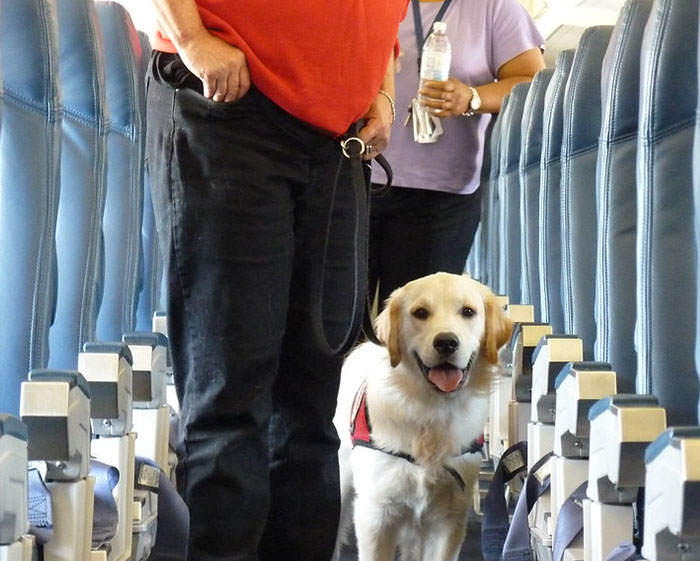
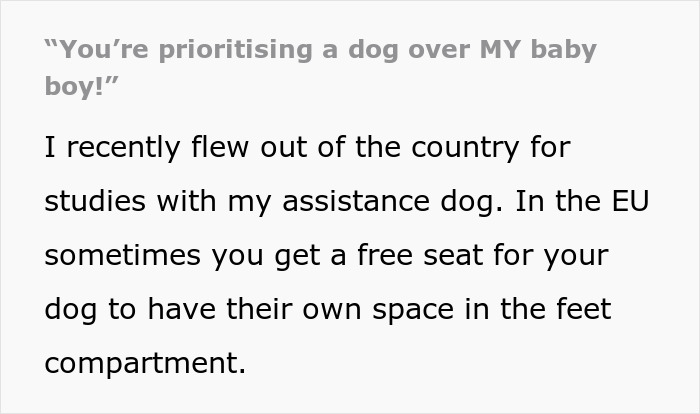


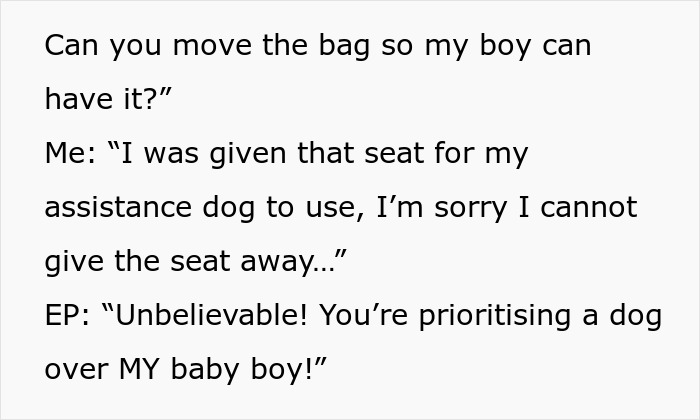


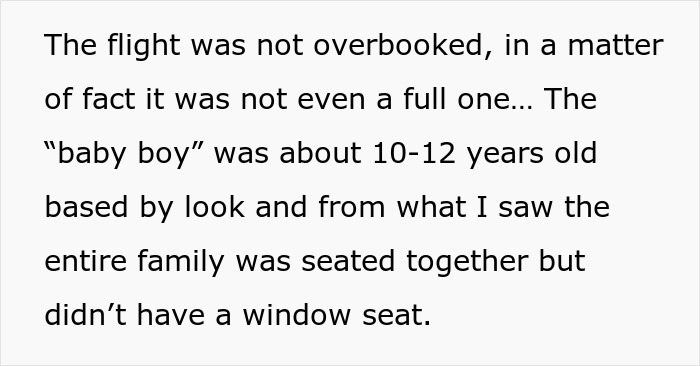
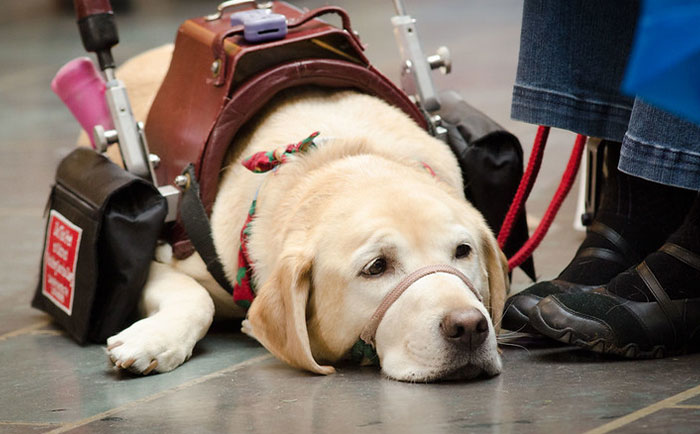
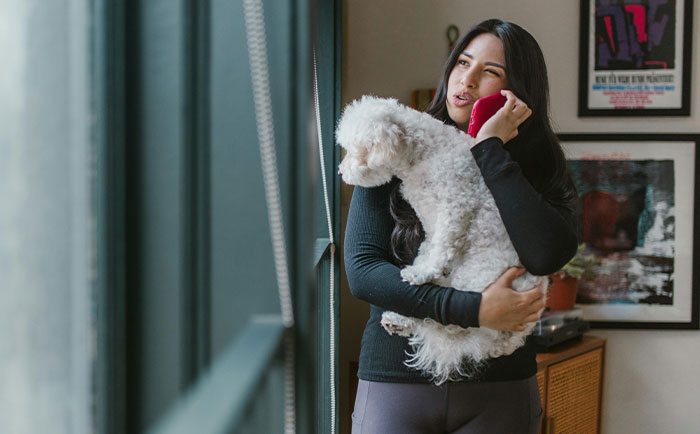

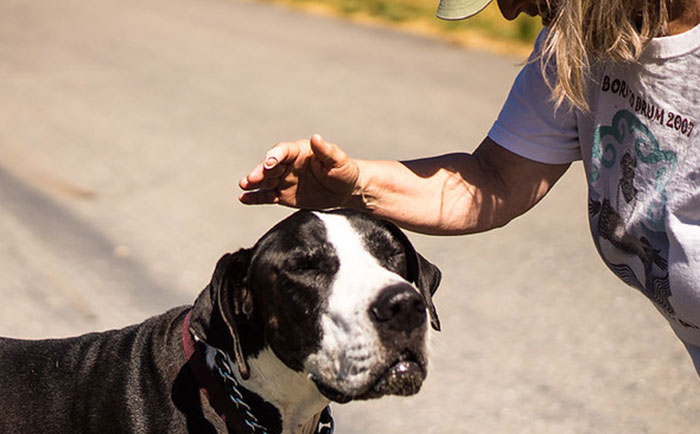


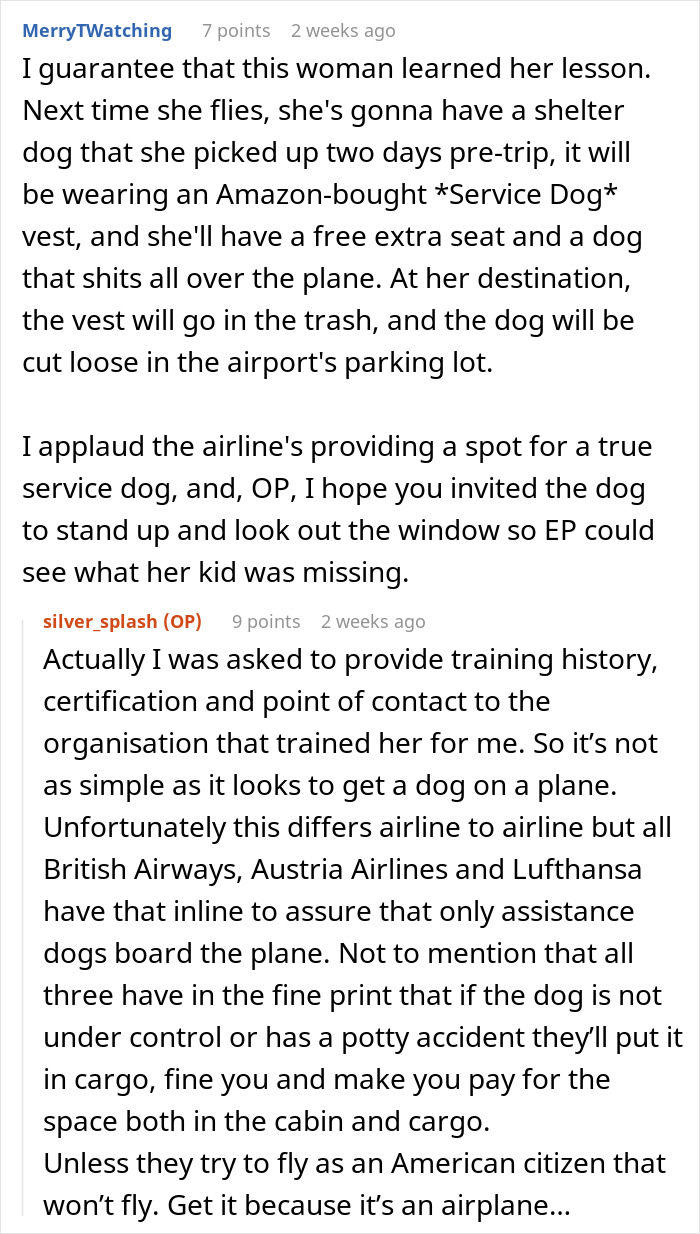

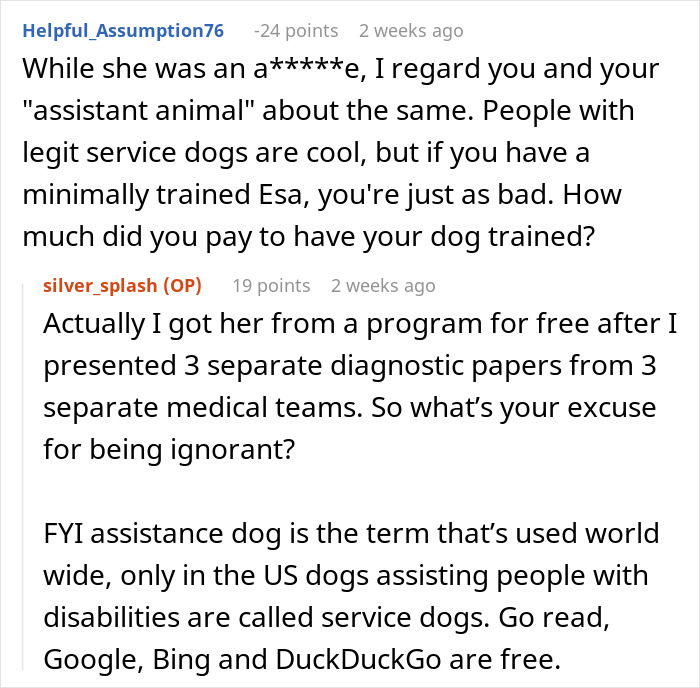


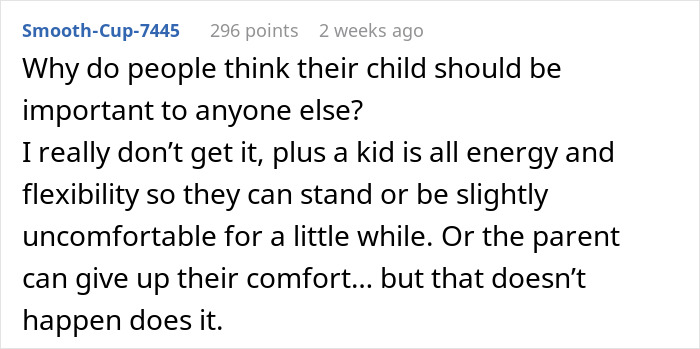


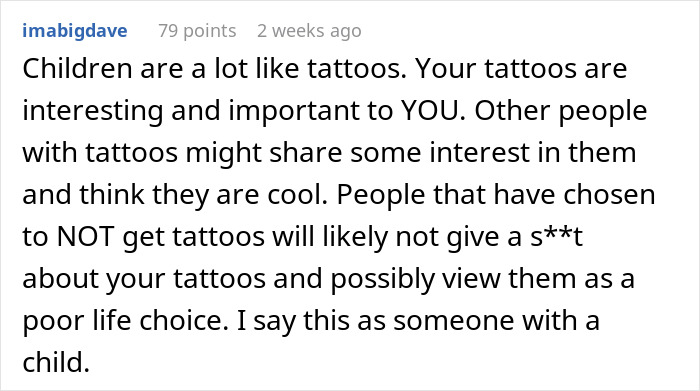






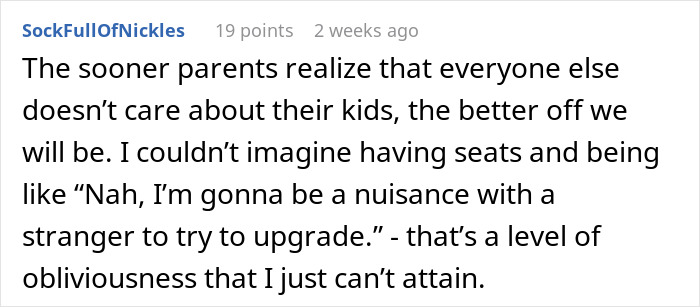














































59
58